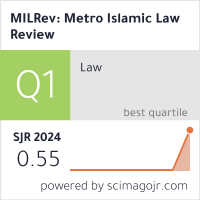Identity Politics and Polarization in Contemporary Muslim Countries: The Impact of Elections, Social Media, and Global Dynamics
DOI:
https://doi.org/10.32332/milrev.v3i2.9909Keywords:
Identity Politics, Global Dynamics, Muslim Countries, Social Media, Polarization.Abstract
This article examines the growing influence of identity politics and polarization in contemporary Muslim countries, focusing on the impact of elections, the widespread role of social media, and global dynamics. As political systems in the Muslim world become more fragmented, identity-based movements—often rooted in ethnic, religious, or sectarian affiliations—have gained significant prominence. These dynamics have heightened political polarization when intertwined with electoral processes, shaping voter behaviour and policymaking. The rise of social media has further transformed political engagement, both as a platform for grassroots activism and a tool for spreading misinformation that deepens societal divisions. This research uses a qualitative approach with literature analysis to explore the relationship between identity politics and polarization in contemporary Muslim countries, focusing on elections, social media, and global dynamics. The findings highlight the urgent need for effective strategies to reduce polarization and promote inclusive governance. Often fueled by identity-based divisions and amplified by social media, polarisation poses serious threats to political and social stability. In today's interconnected world, these divisions extend beyond local and national politics, influencing international relations and regional security. Addressing these challenges requires a comprehensive approach that fosters open dialogue, strengthens democratic institutions, counters misinformation, and raises public awareness to bridge societal gaps. Inclusive governance also demands policies that engage marginalized groups, ensuring fair representation and addressing the root causes of polarization. By adopting these measures, Muslim-majority countries can work toward more excellent political stability and social cohesion.
Downloads
References
Abbas, Ansar, Dian Ekowati, Fendy Suhariadi, dan Aisha Anwar. "Human Capital Creation: A Collective Psychological, Social, Organizational and Religious Perspective." Journal of Religion and Health 63, no. 3 (Juni 2024): 2168–2200. https://doi.org/10.1007/s10943-022-01665-8. DOI: https://doi.org/10.1007/s10943-022-01665-8
Aboi, E.J. "Religious, ethnic and regional identities in Nigerian politics: a shared interest theory." African Identities, 2024. https://doi.org/10.1080/14725843.2024.2394181. DOI: https://doi.org/10.1080/14725843.2024.2394181
Al-Tamimi, Adeb Abdulelah Abdulwahid, dan Uddagatti Venkatesha. "The Main Factors of Yemeni Conflict: An Analysis." JDP (Jurnal Dinamika Pemerintahan) 4, no. 2 (31 Agustus 2021): 1–14. https://doi.org/10.36341/jdp.v4i2.1912. DOI: https://doi.org/10.36341/jdp.v4i2.1912
Ardipandanto, Aryojati. “Dampak Politik Identitas Pada Pilpres 2019: Perspektif Populisme [The Impact of Identity Politics On President Election 2019: Populism Perspective].” Jurnal Politica Dinamika Masalah Politik Dalam Negeri dan Hubungan Internasional 11, no. 1 (24 Juli 2020): 43–63. https://doi.org/10.22212/jp.v11i1.1582. DOI: https://doi.org/10.22212/jp.v11i1.1582
Baba, Sofiane, Omar Hemissi, dan Taïeb Hafsi. "National identity and organizational identity in Algeria: Interactions and influences." M@n@gement 24, no. 2 (1 Oktober 2021): 66–125. DOI: https://doi.org/10.37725/mgmt.v24.7809
Bahrampour, Yalda, Abolghasem Taheri, dan Mojtaba Maghsoudi. "Politicization of Ethnic and Religious Identities from Perspective of Political Stability in Egypt after Arab Spring (2011–2022)." International Studies Journal (ISJ) 20, no. 4 (1 Januari 2024): 245–69. https://doi.org/10.22034/isj.2023.370911.1954.
Brisbane, G.J. "Religious Identity, Politics, and the Media: What White Evangelical Christian Women's Religious Identity Reveals About Their Endorsement of Donald J. Trump and Distrust of News Outlets." Journal of Communication Inquiry 48, no. 1 (2024): 46–70. https://doi.org/10.1177/01968599221120060. DOI: https://doi.org/10.1177/01968599221120060
Delibaş, K. "Religious identity and participatory individual: Identity politics and the rise of political Islam in Turkey." Amme Idaresi Dergisi 41, no. 2 (2008): 131–59.
Dijkink, Gertjan. Review of Review of Globalized Islam. The Search for a New Ummah, oleh Olivier Roy. GeoJournal 67, no. 4 (2006): 377–79. DOI: https://doi.org/10.1007/s10708-007-9064-1
Fernando, Henky, Yuniar Galuh Larasati, Irwan Abdullah, Hasse Jubba, Abdul Mugni, dan Pratama D. Persadha. "The de-existence of Islamic political parties in general elections: A case study of Indonesia as a Muslim-majority country." Cogent Social Sciences 9, no. 1 (31 Desember 2023): 2225838. https://doi.org/10.1080/23311886.2023.2225838. DOI: https://doi.org/10.1080/23311886.2023.2225838
Fikri, Sirajudin. “Politik Identitas dan dan penguatan Demokrasi Lokal (Kekuatan Wong kito dalam demokrasi lokal).” Tamaddun: Jurnal Kebudayaan dan Sastra Islam 18, no. 2 (28 Desember 2018): 167–81. https://doi.org/10.19109/tamaddun.v18i2.2701. DOI: https://doi.org/10.19109/Tamaddun.v18i2.2701
Hakim, Putri Rahmah Nur, Irwan Abdullah, dan Lina Marlina. "Aceh and the Politics of Islamic Identity: Implications for Social and Political Dynamics." Jurnal Politik Profetik 12, no. 2 (25 September 2024): 98–115. https://doi.org/10.24252/profetik.v12i2a1.
Hanan, Djayadi. "Identity Politics In The 2019 Indonesian General Elections: Its Significance And Limitation." JWP (Jurnal Wacana Politik) 5, no. 1 (4 Maret 2020): 15–25. https://doi.org/10.24198/jwp.v5i1.27710. DOI: https://doi.org/10.24198/jwp.v5i1.27710
Handayani, Diah. "Political Identity, Popular Culture, and Ideological Coercion: The Discourses of Feminist Movement in the Report of Ummi Magazine." Jurnal Pemberdayaan Masyarakat: Media Pemikiran Dan Dakwah Pembangunan 5, no. 1 (18 Juni 2021): 191–218. https://doi.org/10.14421/jpm.2021.051-08. DOI: https://doi.org/10.14421/jpm.2021.051-08
Hariyanto, Didik, Ferry Adhi Dharma, Ishak Yussof, dan Fajar Muharram. "The Hyperreality of Identity Politics on Social Media." Communicatus: Jurnal Ilmu komunikasi 8, no. 1 (28 Juni 2024): 19–38. https://doi.org/10.15575/cjik.v8i1.28356. DOI: https://doi.org/10.15575/cjik.v8i1.28356
Hayati, Cucu Nur, A. Bakir Ihsan, dan Muhammad Farras Shaka. "The Influence of Social Media on Religious Identity Politics among Indonesian Millennial Generation." Simulacra 5, no. 2 (24 November 2022): 57–70. https://doi.org/10.21107/sml.v5i2.16621. DOI: https://doi.org/10.21107/sml.v5i2.16621
Haynes, J. "Politics, identity and religious nationalism in Turkey: From atatürk to the AKP." Australian Journal of International Affairs 64, no. 3 (2010): 312–27. https://doi.org/10.1080/10357711003736477. DOI: https://doi.org/10.1080/10357711003736477
Helaluddin, dan Hengki Wijaya. Analisis Data Kualitatif: Sebuah Tinjauan Teori & Praktik. Sekolah Tinggi Theologia Jaffray, 2019.
Hoerudin, Cecep Wahyu. "The Influence of Language in Forming Political Identity in Indonesia." Endless: International Journal Of Future Studies 7, no. 2 (6 Agustus 2024): 66–76.
Hussain, Muzammil M., dan Philip N. Howard. Democracy's Fourth Wave? Digital Media and the Arab Spring. Oxford University Press, 2013. http://deepblue.lib.umich.edu/handle/2027.42/117564.
Hutapea, Elsa Kristina, Puguh Santoso, Halomoan Freddy Sitinjak Alexandra, Achmed Sukendro, dan Pujo Widodo. “Tantangan Dan Upaya Penanganan Politik Identitas Pada Pemilu 2024.” Jurnal Kewarganegaraan 7, no. 1 (10 Mei 2023): 424–34. https://doi.org/10.31316/jk.v7i1.4811.
Karim, Abdul Gaffar. “Mengelola Polarisasi Politik dalam Sirkulasi Kekuasaan di Indonesia: Catatan bagi Agenda Riset.” Politika: Jurnal Ilmu Politik 10, no. 2 (31 Oktober 2019): 215–28. https://doi.org/10.14710/politika.10.2.2019.200-210. DOI: https://doi.org/10.14710/politika.10.2.2019.200-210
Khasanah, Isrofiah Laela, dan Fadli Zumadila Wawuan. “Polarisasi Politik dan Upaya Rekonsiliasi melalui Halal Bihalal.” Jurnal Ilmiah Muqoddimah : Jurnal Ilmu Sosial, Politik, dan Humaniora 7, no. 2 (3 Agustus 2023): 420–29. https://doi.org/10.31604/jim.v7i2.2023.420-429. DOI: https://doi.org/10.31604/jim.v7i2.2023.420-429
Kocu, Jonny Ricardo, dan Guno Tri Tjahjoko. “Politik Identitas Dalam Birokrasi Di Kabupaten Maybrat.” Journal of Indonesian Rural and Regional Government 6, no. 1 (25 Juni 2022): 74–90. https://doi.org/10.47431/jirreg.v6i1.176. DOI: https://doi.org/10.47431/jirreg.v6i1.176
Koellner, T. "Religion and politics in contemporary Russia: Entanglements, identity making, and nation building." Dalam When Politics Meets Religion: Navigating Old Challenges and New Perspectives, 8–23, 2024. https://doi.org/10.4324/9781003422976-2. DOI: https://doi.org/10.4324/9781003422976-2
Le Sueur, James D. Uncivil War: Intellectuals and Identity Politics during the Decolonization of Algeria, Second Edition. University of Nebraska Press, 2001. https://doi.org/10.2307/j.ctv21fqjnn. DOI: https://doi.org/10.2307/j.ctv21fqjnn
Leirvik, O. "Religious education, communal identity and national politics in the Muslim world." British Journal of Religious Education 26, no. 3 (2004): 223–36. https://doi.org/10.1080/0141620042000232283. DOI: https://doi.org/10.1080/0141620042000232283
Majid, Abdul, dan Said Amirulkamar. "Identity Politics Approaching the 2024 Election through Social Media Through Sociology of Religion Perspective." Journal of Governance and Public Policy 10, no. 3 (6 Oktober 2023): 274–87. https://doi.org/10.18196/jgpp.v10i3.18088. DOI: https://doi.org/10.18196/jgpp.v10i3.18088
Michael Lindsay, D. "Politics as the construction of relations: Religious identity and political expression." Dalam Evangelicals and Democracy in America, 2:305–30, 2011.
Mohamed, Eid, Aziz Douai, dan Adel Iskandar. "Media, Identity, and Online Communities in a Changing Arab World." New Media & Society 21, no. 5 (1 Mei 2019): 1035–42. https://doi.org/10.1177/1461444818821360. DOI: https://doi.org/10.1177/1461444818821360
Mrduljaš, S. "The Croat-Bosniak Interrelationship in Identity and Politics." Nova Prisutnost 22, no. 2 (2024): 317–32. https://doi.org/10.31192/np.22.2.5. DOI: https://doi.org/10.31192/np.22.2.5
Pratt, Nicola. "Identity, Culture and Democratization: The Case of Egypt." New Political Science 27, no. 1 (1 Maret 2005): 69–86. https://doi.org/10.1080/07393140500030832. DOI: https://doi.org/10.1080/07393140500030832
Qaiser, Raja. "Nationalism and Political Identity in Pakistan: The Rise and Role of Indigenous Identities." The SAIS Review of International Affairs 35, no. 2 (2015): 105–116. DOI: https://doi.org/10.1353/sais.2015.0027
Rambe, Toguan, dan Seva Mayasari. “Politik Identitas Dan Krisis Identitas: Mengungkap Realitas Praktek Politik Di Indonesia.” Jurnal EL-QANUNIY: Jurnal Ilmu-Ilmu Kesyariahan Dan Pranata Sosial 8, no. 1 (13 September 2022): 91–105. https://doi.org/10.24952/el-qanuniy.v8i1.5608. DOI: https://doi.org/10.24952/el-qanuniy.v8i1.5608
Shiddieqy, Ahmad Ash, Padlan Padil Simamora, dan Dinda Difia Madina. "Contemporary Islamic Politics in Tunisia: The Journey of Islamic Democracy Post-Arab Spring." MILRev : Metro Islamic Law Review 3, no. 1 (11 April 2024): 119–40. https://doi.org/10.32332/milrev.v3i1.8976. DOI: https://doi.org/10.32332/milrev.v3i1.8976
Sukoco, Badri Munir, Zuyyinna Choirunnisa, Mohammad Fakhruddin Mudzakkir, Ely Susanto, Reza Ashari Nasution, Sunu Widianto, Anas Miftah Fauzi, dan Wann-Yih Wu. "Empowering leadership and behavioural support for change: the moderating role of a diverse climate." International Journal of Educational Management 36, no. 3 (2022): 296–310. DOI: https://doi.org/10.1108/IJEM-04-2021-0171
Suswanta. “Politik Identitas Dan Identitas Politik.” The Journal Publishing 5, no. 1 (28 Mei 2024): iv+185-iv+185.
Tibi, B. "Islam: Between religious-cultural practice and identity politics." Dalam Conflicts and Tensions, 221–31, 2007. https://doi.org/10.4135/9781446214671.n16. DOI: https://doi.org/10.4135/9781446214671.n21
Triana, Rara, dan Rahel Liska. “Politik Identitas: Apakah Politik Identitas Akan Mempengaruhi Popularitas? (Kajian Politik Identitas Dalam Pilkada Kalteng).” Wacana: Jurnal Ilmu Sosial Dan Ilmu Politik Interdisiplin 7, no. 2 (4 Desember 2020): 163–72.
Wilfred, F. "Religious identities by choice and the politics of conversion." New Approaches to Religion and Power, 2021, 223–45. https://doi.org/10.1007/978-3-030-60738-8_10. DOI: https://doi.org/10.1007/978-3-030-60738-8_10
Wingarta, I. Putu Sastra, Berlian Helmy, Dwi Hartono, I. Wayan Mertadana, dan Reda Wicaksono. “Pengaruh Politik Identitas Terhadap Demokrasi Di Indonesia.” Jurnal Lemhannas RI 9, no. 4 (29 Desember 2021): 117–24. https://doi.org/10.55960/jlri.v9i4.419. DOI: https://doi.org/10.55960/jlri.v9i4.419
Yew-Foong, H. Encountering Islam: The politics of religious identities in Southeast Asia. Encountering Islam: The Politics of Religious Identities in Southeast Asia, 2012. DOI: https://doi.org/10.1355/9789814379939
Yusuf, Taufik, dan Miftahul Hidayah. “Islam Dan Politik Identitas Menjelang Pemilu 2024.” Asketik: Jurnal Agama Dan Perubahan Sosial 7, no. 2 (2023): 267–83. https://doi.org/10.30762/asketik.v7i2.1163. DOI: https://doi.org/10.30762/asketik.v7i2.1163
Downloads
Published
Issue
Section
License
Copyright (c) 2024 Helena Octavianne, Fendy Suhariadi, Mohammad Fakhruddin Mudzakkir, Donny Trianto, Dwi Sulastyawati

This work is licensed under a Creative Commons Attribution-ShareAlike 4.0 International License.










